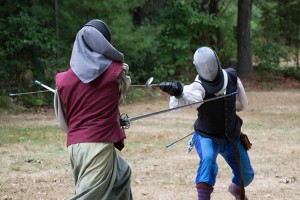 The SCA practices Renaissance style fencing with blunted steel blades. We use blunted steel blades, and we can provide loaner armor and weapons to get you started, and teach you how to make or find your own for the perfect fit. We are happy to welcome new participants, no matter what your skill or experience level. More information about practices is available here. More questions? Contact the Marshal of Fence.
The SCA practices Renaissance style fencing with blunted steel blades. We use blunted steel blades, and we can provide loaner armor and weapons to get you started, and teach you how to make or find your own for the perfect fit. We are happy to welcome new participants, no matter what your skill or experience level. More information about practices is available here. More questions? Contact the Marshal of Fence.
The Steel Ring
The fencers of Carolingia have established a challenge at fencing practice. Fencers will compete to hold the Steel Ring of the Carolingia. The rules of the competition are as follows:
- 5 rounds, 3 challenges per practice
- Challenger may die no more that 2 times and must kill the holder three times to win the ring. Dead is dead, double kills are losses for each
- At least 1 heavy rapier per combatant, Seconds negotiate forms
- One can hold the ring for a maximum of 4 weeks as long as they are at least 1 Carolingian practice per week with the ring.
- If the holder excedes 4 weeks the three challengers that day round robin for the ring. If a ring holder cannot make it to practice they must get the ring to a marshal who will be available to run the tourney between three challengers.
From our Captain: The Steel Ring of Carolingia provides training in a number of vital skill sets. It promotes healthy competition among peers. It is very easy to fall into a lax pattern of familiarity when fencing people in the same group week after week, and this will break up that tendency. It teaches a fencer to not give up and accept defeat before starting a match because they are pitted against a “better” fencer. It provides practice in developing a mindset, and being able to call forth the killer mentality on demand. In contrast but equally as important, there are lessons to be learned about proper comportment in the list, the decorum and rituals of a formal challenge, the finer art of negotiating when acting as a second, and perhaps the most important of all, how to handle yourself in front of your peers in an important match that actually counts for something. The ability to win with humility and respect for your opponent is equally as important as learning to lose a bout with grace and dignity. The words chivalry and honor are not confined to the heavy list field; they are the ideals that we should embody not only in victory and defeat, but in how we live our lives from day to day.
